Editor’s Note: Based in England, Susie Twydell, an avid traveler and wheelchair user since 2012, came up with the idea to start a website aggregating accessible travel information from all over the internet. Her site, wheelchairworld.org, was born in 2015.
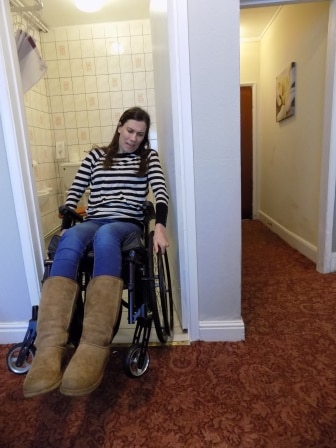 My name is Susie Twydell. I am 39 years old, and I absolutely love traveling. I have been to 78 countries, and this year, my 40th year, I am determined to make the number 80 - double my age! In school, I was terrible at Geography. I remember getting 11% on a geography exam, but now I absolutely love it!
My name is Susie Twydell. I am 39 years old, and I absolutely love traveling. I have been to 78 countries, and this year, my 40th year, I am determined to make the number 80 - double my age! In school, I was terrible at Geography. I remember getting 11% on a geography exam, but now I absolutely love it!
When I was 29, I was diagnosed with RRMS (Relapsing and Remitting Multiple Sclerosis). For the first few years, I was okay (ish!) and then suddenly I hit a quick downhill spiral. In six months, I went from walking okay, to using one stick, then needing two sticks, then finally being in a wheelchair. I am partially sighted and have pretty much lost the use of my dominant hand (left), meaning that I can’t write (no postcards from me!) and typing is a real struggle. I was using voice dictation software quite successfully until my speaking became a problem and my voice would give up after a few hours!
This has caused many complications for my life. There are so many things that you don’t realize how difficult they will be when you are in a wheelchair, and I had no idea of the new challenges that would be brought if I wished to continue traveling. Before my diagnosis, I had been to over 60 countries, lived in five, visited almost every country in mainland South and North America, climbed the Himalayas to Everest base camp and spent a year on tour with a Latin American rock star.
I guess now I am thankful for the strength of character that challenges like this gave me, such as the ability not necessarily to look on the bright side, but to find a bright side. When I first got my diagnosis, it didn’t massively affect my life. My friends put me in touch with other people that had been given the diagnosis and they told me that they had cried for days when they found out. I was surprised by this because I naively thought that I could just carry on with things as they were while coping with the slight physical difficulties that I had acquired - mine were nowhere near as difficult as some of the situations that I had witnessed other people living with in the countries that I had visited. I had no idea how difficult it was going to get.
I still struggle on a daily basis to accept that there are things that I just can’t do - really simple things like pulling up my trousers after I’ve been to the toilet or being able to put the lid on a bottle. I have what is known as neurological fatigue which means that I can do things in the morning that by the evening or night are impossible. I find that it totally messes with my head to have to deal with the fact that I get worse every day, then a little bit better the next morning, then worse again by the evening. I never really know where I am or what I can do.
For me, it is really important to figure out what the most essential things I need to do are, to still feel like me, and find a way to do them, in whatever diluted form. I stay in hotels that I would never before have considered. I used to go out to pubs and clubs with my friends. Now if I want to see my friends, they have to come round to my house. Thankfully, most of them are quite happy to do this, and it is quite nice not having to think about how I get home at the end of the night!
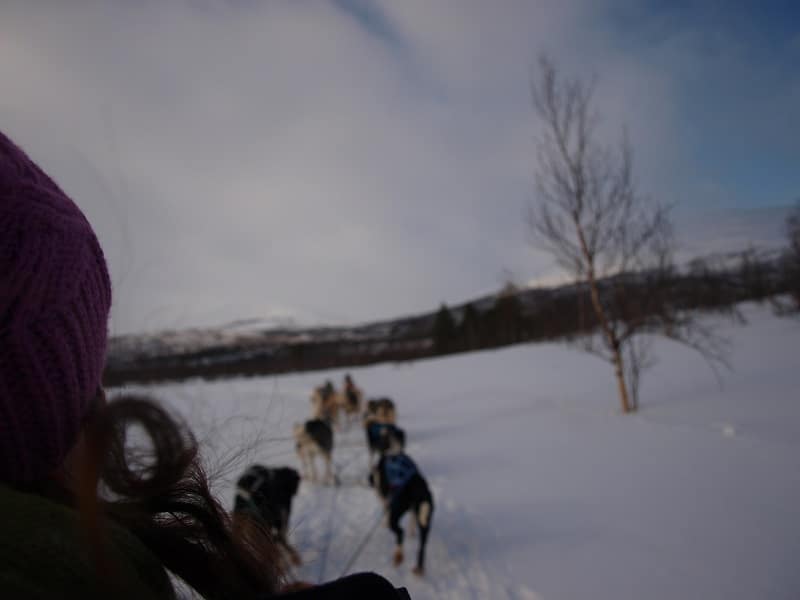
Temperature changes really affect me, so I know that when I go somewhere hot, I am really going to struggle for the first few days until I acclimatize. It’s still a shock to see how much more difficult things are, but so far I’ve gotten through it. On my last holiday to Portugal, the first few days were hell, and I even thought that perhaps the end had come and this would be my last trip. But by the middle of the week, I was back to my normal self. I think that will help me when I’m really struggling next time.
Prioritize your own comfort, because if you’re not comfortable, you probably won’t enjoy the experience.
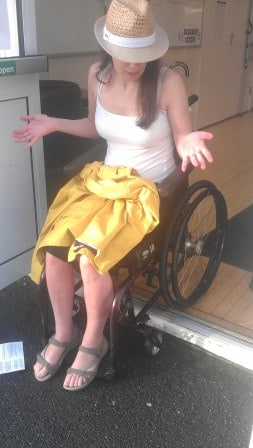 I have tried to accept that I need to find another way to do things so that I can still do them. For example, I used to relish going to small independent restaurants, one-offs. Rarely are these accessible in a wheelchair, and if I want to go out to eat, I have to go to one of the large chain restaurants that I used to detest but often have a disabled toilet and are accessible. My companion and I would much rather be comfortable in a chain restaurant than massively uncomfortable and not really able to enjoy the experience in one of the independent restaurants that I used to love.
I have tried to accept that I need to find another way to do things so that I can still do them. For example, I used to relish going to small independent restaurants, one-offs. Rarely are these accessible in a wheelchair, and if I want to go out to eat, I have to go to one of the large chain restaurants that I used to detest but often have a disabled toilet and are accessible. My companion and I would much rather be comfortable in a chain restaurant than massively uncomfortable and not really able to enjoy the experience in one of the independent restaurants that I used to love.
Another example is shopping. Being partially sighted and in a wheelchair, I no longer enjoy physical shopping - I can’t even see if I’m looking at the right size number! However, I have found that online shopping has benefits. I can easily find out information about the material, check if they have my size in stock and make the image as large as I need.
Having a sense of humor is a key coping mechanism. I can be crying with frustration one minute, but then I crack a joke and the mood changes.
So yeah, sense of humour, prioritising being comfortable, accepting that in order to do the things I love, I have to do them in a different way and remembering that even though I have a physical situation that sucks, I am extremely lucky to be in a country where there is some support for people with disabilities. Things would be a lot worse if I was living on the street in one of the countries that I visited.
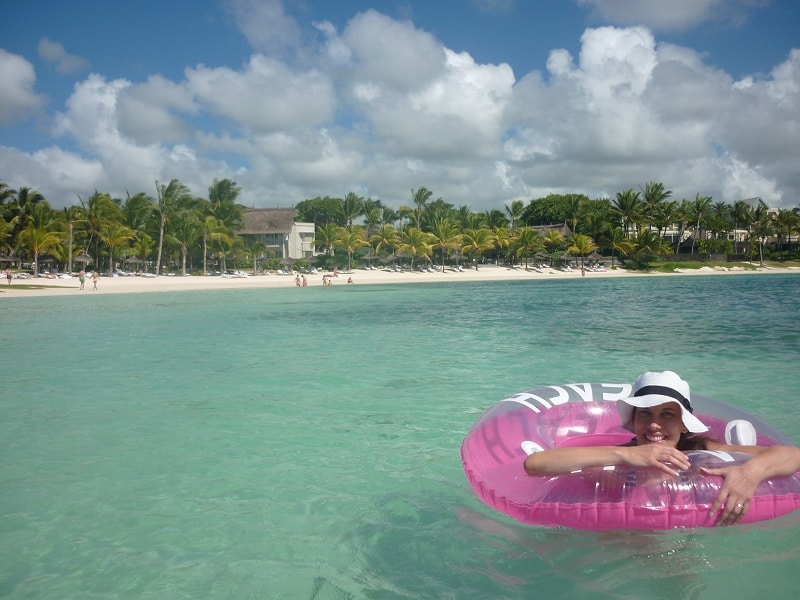
Ljubljana, Slovenia
I got married in 2014 and on a whim, we decided to go to Slovenia for our honeymoon. I was amazed at how fantastically accessible the capital, Ljubljana, was - the old town, which seemed to be the main part of the city, is completely pedestrianized, has pretty much no curbs and very few cobblestones. Nearly all of the restaurants have an accessible outside seating area and even the inside area is often accessible. The biggest challenge is that there are not many disabled toilets so you need either:
I stayed at the City Hotel, which had a disabled toilet in the main area as well as in my room.
Valencia, Spain
I was massively impressed by a recent trip to Valencia, Spain. I stayed in Las Arenas Hotel, which had the best bathroom adaptations I’ve ever encountered (like a horizontally sliding shower seat so you could get dressed well away from any water source!). The nearby Avenida Neptuna had loads of great restaurants that were not only wheelchair accessible, but had disabled toilets! Even the beach itself had boardwalks down towards the water so you could get about 10 meters from the sea in your wheelchair.
Editor’s Note: Avenida Neptuna is a street near the beach in Valencia, Spain. Google Maps refers to it as Passeig de Neptu, the Catalan name.
Japan
Last year, I traveled to Japan, and I found it to be brilliantly accessible - loads of level access, but mainly because most of the train stations, which are everywhere in the big cities, have a universal adapted toilet that can be used by wheelchair users. Thus, it matters little where you go because there will always be an accessible toilet nearby. Additionally, I found the public transport to be very accessible - both trains and buses had ramps and the train or bus attendants were very prompt at helping. I did notice, however, that the train station staff were much more helpful in Tokyo than Kyoto. In Tokyo, it felt like they rushed to help me whereas in Kyoto they seemed a lot less bothered!
Switzerland
The biggest surprise that I have encountered while traveling was in Switzerland - a country that I thought would be excellent for accessibility. I arrived in Geneva and while the area was pretty accessible, I needed a toilet, so I went into a Starbucks. The only adaptation that it had was a very small diagonal rail on the wall! Later on, I had been impressed by the transport website for Basel, as it showed where the accessible entrances were for each tram. However, the reality was quite different - the tram door was about a foot above the platform so there was no level access! Also, the older trams had manual ramps that needed to be opened by the drivers who had a very bad attitude and were most unwilling to help, indicating that I should just bunny hop off their tram!
Norway
I would also mention that in Norway, while I found that in general Oslo was wonderfully accessible, the dropped curbs were not flush to the ground. There was a difference of roughly three inches between the dropped curb and the road! It was definitely doable but took me by surprise because I was expecting better, and it meant that I had to be careful at every curb so I didn’t hit it wrong and get thrown forward.
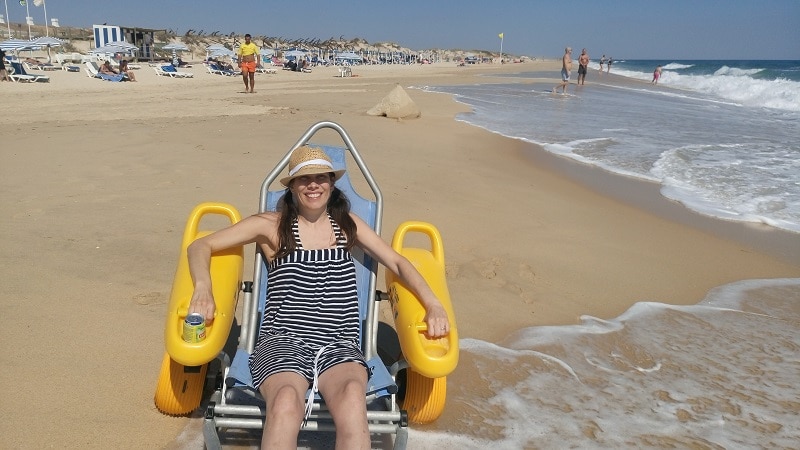
My ultimate dream has always been to see the mountain gorillas in Rwanda. As soon as my mobility began to deteriorate, that dream became less and less likely, and once I became a wheelchair user, I thought it was firmly out of the question. Not so! Thanks to wheelchairworld.org, I have read about a small number of wheelchair users that have made this trip. I have contacted the park rangers directly and seen a photo of the stretcher that they use to carry wheelchair users. There used to be a more commonly used sedan chair, but it got decommissioned as it was being abused by lazy tourists who couldn’t be bothered to walk and just wanted somebody to carry them!
For my 40th birthday, I really want to make this trip. I have asked for all of my birthday and Christmas gifts for the last couple of years to be monetary donations to my “gorilla fund”. I have also looked at my property with different eyes and sold everything I can, converting it all into cash for my “gorilla fund”!
Serendipitously, thanks to wheelchairworld.org, I am now in touch with a wheelchair user from Rwanda, Emmanuel. He posted a country review direct to wheelchairworld.org, and I immediately got in touch. He has set up a group of fellow Rwandan wheelchair users - the Rwanda Wheelchair Users Community (RWUC), and he has told me of the many challenges faced by wheelchair users in Rwanda. He is a really inspiring person; he lived through the genocide and had to leave school while it was happening. He has now managed to gain quite a high level of education and is a very determined person. We are hoping to meet when I go to Rwanda, but it is going to be challenging because he does not live in the capital.
The first time I traveled overseas in my wheelchair (Barbados, December 2012), I was given the most useful tip by a wheelchair using resident. He told me that the beach lifeguards carried him over the sand to the sea every day, kept an eye on his wheelchair, and carried him back when he signaled to them. This was a fantastically useful piece of information and enabled me to enjoy the beach and the sea each day.
I quickly learned the value of information from other wheelchair users and began to look online. However, quite often, blogs and websites by wheelchair users get hidden behind the many websites selling wheelchairs, and information is not easily discovered. I would often find useful information after my trip!
So, I came up with the idea for wheelchairworld.org. It first launched to the public in 2015 although background work began in 2014. Wheelchairworld.org started life as a review site, but I quickly realized that there were already hundreds of wheelchair user travel review sites, and there was more of a need to bring them all together and ensure the right information could be found when needed.
Even now, two years in, I find new blog sites and resources on a daily basis, and I am sure there are plenty more to discover. I have just created a new country listing for Monaco, inspired by a visit by a French wheelchair user. I have since found a few other wheelchair traveler reviews as well as government information about accessibility there and the dedicated beach they have for wheelchair users. Also, I discovered information about a viewing platform for wheelchair users visiting the Grand Prix and free or discounted tickets available for carers.
Editor’s note: “Carers” is the British word for caregivers.
There are so many great reviews and resources out there for wheelchair using travelers, and it is a total shame if the wheelchair user that is planning to visit the destination doesn’t find these. I want to make sure that all the relevant information is in the hands of the wheelchair user that is planning to travel so that they can make an informed decision about their visit and plan accordingly.
Every wheelchair user has different needs and requirements, so the only way to judge if something is right for you is to read about other people’s experiences and look at the available resources.
Spending all day reading about other wheelchair users’ travel experiences makes me feel like the world is full of traveling wheelchair users and that the travel industry is making positive efforts to be accessible. My main goal with wheelchairworld.org is to make wheelchair traveling a commonplace part of traveling, to inspire other wheelchair users to travel more, which in turn helps to increase the demand for accessibility everywhere.
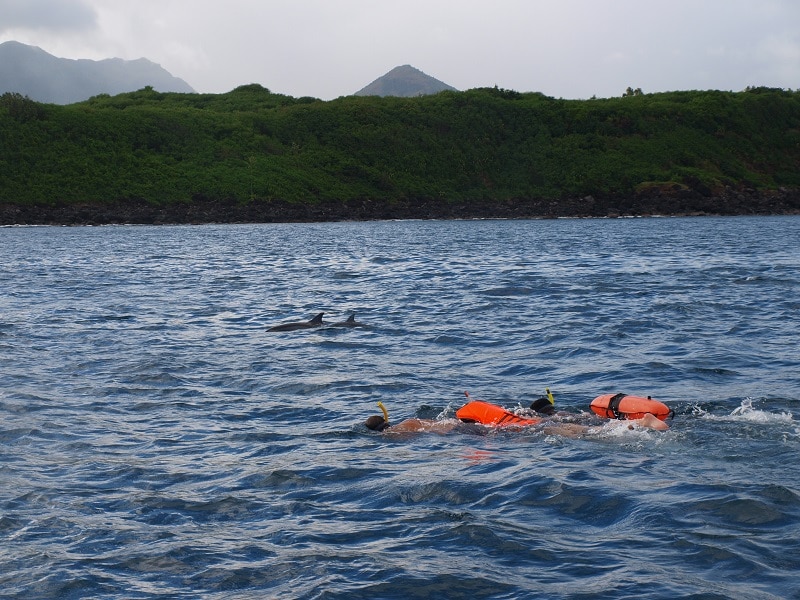
At present, I am the only person working on wheelchairworld.org. The huge amount of information on there is a testament to how much I love traveling and being inspired by other wheelchair users’ travel experiences. For example, I had never considered going to Monaco before, but now that I have read about their dedicated beach, I might be interested in paying a visit!
I would be very keen to hear from other wheelchair users who would like to be involved. Wheelchairworld.org generates no income so it is completely voluntary, but really rewarding in another way!
Editor’s note: If you would like to get involved with wheelchairworld.org, get in touch with Susie at contactus@Wheelchairworld.org.
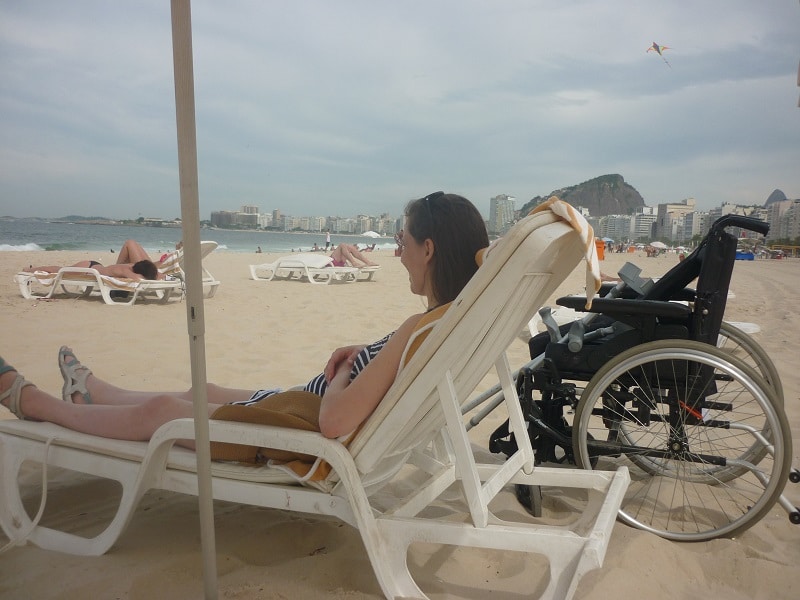
Wheelchairworld.org is currently on a website that was intended for reviews, not thousands of links. I need to move it to a more appropriate platform, which will be far more user-friendly and also allow me to link to very useful information about non-country specific travel topics such as airlines, travel agents or hotel search engines.
I am currently running a JustGiving fundraising campaign. If you would like to donate, you can do so here
https://www.justgiving.com/crowdfunding/susie-wheelchairworld?utm_id=60&utm_term=xNNErVWAy
Find wheelchairworld on Facebook or follow @worldwheelchair on Twitter to keep up with daily additions!
Betsy Bailey has a diverse background including experience in marketing research at American Express, business operations and client relations with 601am, travel and culinary writing with VegDining, and playing volleyball professionally overseas.
Betsy is excited to get back into writing, something she’s adored since childhood, and thoroughly enjoys the process of getting to know her interviewees. On top of her work with Wheel:Life, she also teaches students learning English as a second language, speaks French fluently, and travels any chance she gets!